- Administrator
- Albums and Singles
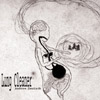 Conceived as a therapeutic agent for Anomalous label head Eric Lanzillotta as he suffered from a serious lung infection, Lung Cleaneris just the kind of dizzying, confused music I'd specifically avoid ifever visited by a similar illness. If the artist's goal was to create aseries of immersing sound-environments for the bedridden, then he'ssucceeded, only these four tracks are hardly comforting, and with nameslike "Dizzy From the Cold Meds" and "Coughing up the Lung Cleaner,"they seem more appropriate for a healthy person looking to simulate theinfected state. If there is any fluidity to the music it's only becausethere is rarely any silence, each moment tempted by multiple layers ofqueasy sound, never very noisy but always arriving at warped,uncomfortable angles. To his credit, Deutsch does take sound from avariety of inviting sources, including wine glasses, bells, musicboxes, even baby toys, each left well enough intact to make forsurprisingly warm, physical compositions, despite the reliance ondigital technology. Certain sections of the disc, especially theopening "Nice Day, Some Rain" with its cascading violin-like washes andgurgling water percussion, sound as if they could be played by bucolicdrone ensemble Pelt; however, Deutsch practices little of that group'srestraint when applying thick, busy layers of amplified clatter fromhis own unique box of gadgets. The degree to which he is able toorganize so many small, fleeting sounds into dense and coherentclusters, without the digital process stripping them of theirlivelihood, remains an amazing feat throughout, but sadly, this is thelimit of Lung Cleaner's appeal. The compositions seem for themost part aimless, with no progressive intent behind their changes inpalette and texture. And while logical progression might be outside ofthe artist's immediate interests, his creations here are too shambolicand scatterbrained for their created environments to be at allsatisfying. There's no release to the aural nausea induced by thesetracks; even the closing "Sleep Fields (go to sleep)" provides nosolace for the sickly, it's slowly repetitive gurgles and pangingnoises winding up again and again for another anxious heave. That said,it is also rare to find music of similar creation that sounds as"alive" as Lung Cleaner, leading me think that either I couldbe trying harder to hear these quasi-"familiar" sounds in new ways orDeutsch should be more wary of the redundancy created in pushingalready animated source material into a frenzied compositionalstructure. Then again, maybe I just need to get violently ill, pound abottle of Robitussin and have another listen, compare and contrast.
Conceived as a therapeutic agent for Anomalous label head Eric Lanzillotta as he suffered from a serious lung infection, Lung Cleaneris just the kind of dizzying, confused music I'd specifically avoid ifever visited by a similar illness. If the artist's goal was to create aseries of immersing sound-environments for the bedridden, then he'ssucceeded, only these four tracks are hardly comforting, and with nameslike "Dizzy From the Cold Meds" and "Coughing up the Lung Cleaner,"they seem more appropriate for a healthy person looking to simulate theinfected state. If there is any fluidity to the music it's only becausethere is rarely any silence, each moment tempted by multiple layers ofqueasy sound, never very noisy but always arriving at warped,uncomfortable angles. To his credit, Deutsch does take sound from avariety of inviting sources, including wine glasses, bells, musicboxes, even baby toys, each left well enough intact to make forsurprisingly warm, physical compositions, despite the reliance ondigital technology. Certain sections of the disc, especially theopening "Nice Day, Some Rain" with its cascading violin-like washes andgurgling water percussion, sound as if they could be played by bucolicdrone ensemble Pelt; however, Deutsch practices little of that group'srestraint when applying thick, busy layers of amplified clatter fromhis own unique box of gadgets. The degree to which he is able toorganize so many small, fleeting sounds into dense and coherentclusters, without the digital process stripping them of theirlivelihood, remains an amazing feat throughout, but sadly, this is thelimit of Lung Cleaner's appeal. The compositions seem for themost part aimless, with no progressive intent behind their changes inpalette and texture. And while logical progression might be outside ofthe artist's immediate interests, his creations here are too shambolicand scatterbrained for their created environments to be at allsatisfying. There's no release to the aural nausea induced by thesetracks; even the closing "Sleep Fields (go to sleep)" provides nosolace for the sickly, it's slowly repetitive gurgles and pangingnoises winding up again and again for another anxious heave. That said,it is also rare to find music of similar creation that sounds as"alive" as Lung Cleaner, leading me think that either I couldbe trying harder to hear these quasi-"familiar" sounds in new ways orDeutsch should be more wary of the redundancy created in pushingalready animated source material into a frenzied compositionalstructure. Then again, maybe I just need to get violently ill, pound abottle of Robitussin and have another listen, compare and contrast.Read More
- Administrator
- Albums and Singles
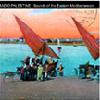 Radio Palestine is the most recent of Alan Bishop's amazingradio collages released on his Sublime Frequencies label. "Palestine"is used here as a blanket term to denote the whole of the EasternMediterranean encompassing the various locations where these soundswere recorded over the summer of 1985. Bishop captures a stunningsnapshot of a region splintered by political upheaval and violence, butunited in its teeming, eclectic overload of cultures, traditions andlifestyles. Radio Palestine cycles through an endless multitude ofdisparate styles: the Nile River Nubian folk of Southern Egypt, modernArabic pop from Beirut, orchestrals from Cairo, Greek sartaki,Palestinian folk, shortwave signal jamming, Jewish Klezmer and othertraditional forms, European pop hybrids, Jordanian reverb guitar andscores of news reports, commercials and radio station IDs in aBabel-like cacophony of languages and dialects. English news reportsprovide grim details of terrorist bombings and political tensions inthe region, clearly showing just how little has changed in theintervening two decades. This prismatic approach to splicing togethermusic and dialogue is extraordinarily effective, juxtaposing absurdlyoverwrought French lounge music from Beirut with minimalist, hypnoticfolk of Egypt which might suddenly and unexpectedly segue intoshortwave radio interceptions of messages from military spies,clandestine political organizations and what sounds like fieldrecordings of gunfire and explosions recorded in the midst of Israeliskirmishes with the PLO. And I was just as likely to hear that kind ofhuman bloodshed as I was to catch a few seconds of Robert Wyatt's "SeaSong" or experimental female vocal pop sounding not unlike a LebaneseKate Bush. "Tangental Psychedelico" contains an amazing performance byan unknown Jordanian artist, calling up the spirits of Islam with theresonant echoes of his desert-surf guitar. Radio Palestine is apowerfully constructed document that forgoes making any politicalstatements, instead painting a painfully ephemeral portrait of acountry in violent flux.
Radio Palestine is the most recent of Alan Bishop's amazingradio collages released on his Sublime Frequencies label. "Palestine"is used here as a blanket term to denote the whole of the EasternMediterranean encompassing the various locations where these soundswere recorded over the summer of 1985. Bishop captures a stunningsnapshot of a region splintered by political upheaval and violence, butunited in its teeming, eclectic overload of cultures, traditions andlifestyles. Radio Palestine cycles through an endless multitude ofdisparate styles: the Nile River Nubian folk of Southern Egypt, modernArabic pop from Beirut, orchestrals from Cairo, Greek sartaki,Palestinian folk, shortwave signal jamming, Jewish Klezmer and othertraditional forms, European pop hybrids, Jordanian reverb guitar andscores of news reports, commercials and radio station IDs in aBabel-like cacophony of languages and dialects. English news reportsprovide grim details of terrorist bombings and political tensions inthe region, clearly showing just how little has changed in theintervening two decades. This prismatic approach to splicing togethermusic and dialogue is extraordinarily effective, juxtaposing absurdlyoverwrought French lounge music from Beirut with minimalist, hypnoticfolk of Egypt which might suddenly and unexpectedly segue intoshortwave radio interceptions of messages from military spies,clandestine political organizations and what sounds like fieldrecordings of gunfire and explosions recorded in the midst of Israeliskirmishes with the PLO. And I was just as likely to hear that kind ofhuman bloodshed as I was to catch a few seconds of Robert Wyatt's "SeaSong" or experimental female vocal pop sounding not unlike a LebaneseKate Bush. "Tangental Psychedelico" contains an amazing performance byan unknown Jordanian artist, calling up the spirits of Islam with theresonant echoes of his desert-surf guitar. Radio Palestine is apowerfully constructed document that forgoes making any politicalstatements, instead painting a painfully ephemeral portrait of acountry in violent flux. Read More
- Administrator
- Albums and Singles
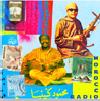 Out of the thousands of tedious archival record labels popping uprecently in this accelerated age of information overload, it's great tofind a label as fascinating as Sublime Frequencies. Alan Bishop of theSun City Girls created Sublime Frequencies as an outlet to releasevideo and sound recordings collected in his travels around the globe.Bishop's release schedule thus far has vividly illustrated his view ofthe third world as an alien landscape, an enticing ethnic cacophony ofmarginalized cultures and traditions, obscure music, vibrantenvironmental noises, hallucinogenic otherness and unraveled threads ofthe human narrative. Alan Bishop neatly sidesteps all of the tiredimplications of "world music" by refusing to editorialize; he simplyreleases unadulterated vintage recordings, impromptu radio collages,untreated field recordings and personal home videos. The recordings arequickly slapped onto the digital format and released with a minimum ofpost-production or fussy packaging. Radio Moroccois the sixth CD released on the Sublime Frequencies imprint, and it'salso one of the most intriguing. Culled from recordings of radiotransmissions intercepted all along the Moroccan coast in the summer of1983, Radio Morocco is a kaleidoscopic trip throughFrench-Moroccan pop, French and Arabic news reports, Berbertrance-folk, Arabic divas, Middle Eastern orchestral music, Europeannew wave, hypnotic jajouka and shortwave radio noise. I was immediatelyreminded of the revolutionary cut-ups produced by William S. Burroughsand Brion Gysin on Break Through in Grey Room that were oftenculled from radio and field recordings from Tangier. Interspersedthroughout are live recordings of Arabic divas like the legendary OumKoulthoum, who perform for an enraptured crowd of men who zealouslyshout "Allah!" at the end of each sexually charged refrain. At varioustimes, Radio Morocco operates as a sonic avatar, an audio timecapsule, a free-form diary through the crossroads of Western Africa, orexpressionist collage. Although Bishop clearly sees Sublime Frequenciesfulfilling the same sort of archival musical preservation function of alabel like Smithsonian Ethnic Folkways, Radio Morocco simplydoesn't work on that level. None of the performers or musical stylesthat we hear throughout the disc are identified in the liner notes, soits historical value is questionable. Instead, Radio Morocco isa postmodern collage of cultures alternately melding and clashing,replicating the fragmented memories of a unique time and place. Uponrepeated listens, these sounds can download into the listener's brainas an anti-virus to an unimaginative, safe and homogenized Westernculture that daily threatens to erase our uniqueness and culturalheritage forever.
Out of the thousands of tedious archival record labels popping uprecently in this accelerated age of information overload, it's great tofind a label as fascinating as Sublime Frequencies. Alan Bishop of theSun City Girls created Sublime Frequencies as an outlet to releasevideo and sound recordings collected in his travels around the globe.Bishop's release schedule thus far has vividly illustrated his view ofthe third world as an alien landscape, an enticing ethnic cacophony ofmarginalized cultures and traditions, obscure music, vibrantenvironmental noises, hallucinogenic otherness and unraveled threads ofthe human narrative. Alan Bishop neatly sidesteps all of the tiredimplications of "world music" by refusing to editorialize; he simplyreleases unadulterated vintage recordings, impromptu radio collages,untreated field recordings and personal home videos. The recordings arequickly slapped onto the digital format and released with a minimum ofpost-production or fussy packaging. Radio Moroccois the sixth CD released on the Sublime Frequencies imprint, and it'salso one of the most intriguing. Culled from recordings of radiotransmissions intercepted all along the Moroccan coast in the summer of1983, Radio Morocco is a kaleidoscopic trip throughFrench-Moroccan pop, French and Arabic news reports, Berbertrance-folk, Arabic divas, Middle Eastern orchestral music, Europeannew wave, hypnotic jajouka and shortwave radio noise. I was immediatelyreminded of the revolutionary cut-ups produced by William S. Burroughsand Brion Gysin on Break Through in Grey Room that were oftenculled from radio and field recordings from Tangier. Interspersedthroughout are live recordings of Arabic divas like the legendary OumKoulthoum, who perform for an enraptured crowd of men who zealouslyshout "Allah!" at the end of each sexually charged refrain. At varioustimes, Radio Morocco operates as a sonic avatar, an audio timecapsule, a free-form diary through the crossroads of Western Africa, orexpressionist collage. Although Bishop clearly sees Sublime Frequenciesfulfilling the same sort of archival musical preservation function of alabel like Smithsonian Ethnic Folkways, Radio Morocco simplydoesn't work on that level. None of the performers or musical stylesthat we hear throughout the disc are identified in the liner notes, soits historical value is questionable. Instead, Radio Morocco isa postmodern collage of cultures alternately melding and clashing,replicating the fragmented memories of a unique time and place. Uponrepeated listens, these sounds can download into the listener's brainas an anti-virus to an unimaginative, safe and homogenized Westernculture that daily threatens to erase our uniqueness and culturalheritage forever. Read More
- Administrator
- Albums and Singles
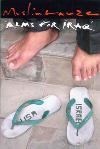 I'm certainly not the first to observe this strange paradox, and I won't be the last, but it seems that the release schedule of new Muslimgauze albums has somehow increased exponentially since the death of Bryn Jones. Every month since Jones' untimely passing has brought at least one new release to his already preposterous discography, often two or three. At this stage, I'm actually having a hard time believing that even the absurdly prolific Bryn Jones committed this much unreleased material to tape before his demise. By this point, Gauze might actually have crossed that Biggie Smalls milestone, having released more albums posthumously than those released during his life. I have to admit however, perusing the newly released 77-minute Alms For Iraq on Soleilmoon, it's hard to say who else could have produced this music other than the singular Muslimgauze.Soleilmoon
I'm certainly not the first to observe this strange paradox, and I won't be the last, but it seems that the release schedule of new Muslimgauze albums has somehow increased exponentially since the death of Bryn Jones. Every month since Jones' untimely passing has brought at least one new release to his already preposterous discography, often two or three. At this stage, I'm actually having a hard time believing that even the absurdly prolific Bryn Jones committed this much unreleased material to tape before his demise. By this point, Gauze might actually have crossed that Biggie Smalls milestone, having released more albums posthumously than those released during his life. I have to admit however, perusing the newly released 77-minute Alms For Iraq on Soleilmoon, it's hard to say who else could have produced this music other than the singular Muslimgauze.Soleilmoon
Multiple tracks of sampled rhythms abruptly explode out of nowhere, spraying violent distortion across layers of interwoven samples of Arabic music. Scattershot, sweltering tabla rhythms are suddenly phased and mutated across the stereo channels, with moments of arrhythmic hiccupping and digital blurring maintaining a consistently aggressive, intense atmosphere. "Pale Elegant Egyptian" sounds like something Coil might have recorded for Horse Rotorvator, a mysterious Nubian folk loop matched with a pounding, hashish-filtered industrial rhythm. For most of the album, the dials are turned all the way up in an effort to push the distortion into the red zone, so many of the beats converge into a thick amorphous cloud of smoke. Dub techniques are utilized in unique ways, quiet passages that serve as the quiet before the storm, giving way to machine gun rhythms and fiery distortion. For those masochistic enough to be Gauze completists, the quality of the music on this disc is pretty much irrelevant: no doubt you've already purchased this. For those who enjoy only the occasional dip into this artists' imposing catalog, however, I can guardedly recommend Alms For Iraq as one of the better examples of late-period Muslimgauze. One thing that stands out about this release is the packaging: a tall cardboard wallet with six panels of disturbing images culled from alternative media websites dedicated to publicizing the ongoing atrocities in Iraq and Palestine. It's well-known that Bryn Jones was deeply moved by the plight of the disenfranchised Palestinians, and I would further conjecture that he felt his music could serve as audio terrorism, a series of violent missives to spread a message of an oppressed group of people. The cover image shows bare Arabic feet above a pair of sandals bearing the words "ISRAEL" and "USA." To the uninitiated, this might seem like a plea for tolerance and unity, until you realize that for Arabs, anything that touches the bottom of their feet is vile and unclean. One thing that Israel and the Western allies seem unable or unwilling to understand is that the "war on terrorism" will never be won. Terrorism is the symptom, not the disease itself. Anyone at the CDC would agree that the cause of an epidemic must be attacked, not its symptoms. Terrorism is the last brutal resort of a people who have no other voice, but refuse to surrender.
Read More
- Administrator
- Albums and Singles
 Razing Darkness is the five years young solo project of South Carolina resident Jason Danielson. He is also a longtime member of the Tapegerm Collective, a "non-profit community of loop-based recording artists" in which members from around the world may cross pollinate megs upon gigs of sounds via good old fashioned file transfer protocol. Razing Germs is the result of 30 others' contributions being fed through the Razing Darkness filter over two years. Danielson adeptly composes and mixes with a palette that includes all manner of machinations, synth sounds, some percussive elements, heavily manipulated samples and various other more easily identifiable samples like bird song, lapping water and electricity. Nearly every track surrealistically (though more serious than humorous) juxtaposes moments of controlled calm and barely controlled chaos. The noisier end of the spectrum is well represented and listenable throughout but it's the more ambient end that I find most intriguing. "Bottom Dweller" announces itself with metallic sheen and later transitions to somnambulist drift and near-tinnitus tones. "In Death's Dreams", the lengthiest at nine minutes and my favorite, subconsciously shifts from deep moans and grumbles to brighter rays and surges, gradually revealing a light at the end of the tunnel. "Dimension Arachnia" opens with a gorgeous melodic loop then slips into fluid electronic waves and random-ish bleeps and faux disco beats. The occasional rhythm or melody comes off a bit forced but overall it's an almost surprisingly cohesive whole. Danielson is an amateur on his way to becoming a pro. Also of note is the wonderful cover art by DeVico, an antiquated partial profile of a woman whose beautiful features transition into tree branches and reptilian scales.
Razing Darkness is the five years young solo project of South Carolina resident Jason Danielson. He is also a longtime member of the Tapegerm Collective, a "non-profit community of loop-based recording artists" in which members from around the world may cross pollinate megs upon gigs of sounds via good old fashioned file transfer protocol. Razing Germs is the result of 30 others' contributions being fed through the Razing Darkness filter over two years. Danielson adeptly composes and mixes with a palette that includes all manner of machinations, synth sounds, some percussive elements, heavily manipulated samples and various other more easily identifiable samples like bird song, lapping water and electricity. Nearly every track surrealistically (though more serious than humorous) juxtaposes moments of controlled calm and barely controlled chaos. The noisier end of the spectrum is well represented and listenable throughout but it's the more ambient end that I find most intriguing. "Bottom Dweller" announces itself with metallic sheen and later transitions to somnambulist drift and near-tinnitus tones. "In Death's Dreams", the lengthiest at nine minutes and my favorite, subconsciously shifts from deep moans and grumbles to brighter rays and surges, gradually revealing a light at the end of the tunnel. "Dimension Arachnia" opens with a gorgeous melodic loop then slips into fluid electronic waves and random-ish bleeps and faux disco beats. The occasional rhythm or melody comes off a bit forced but overall it's an almost surprisingly cohesive whole. Danielson is an amateur on his way to becoming a pro. Also of note is the wonderful cover art by DeVico, an antiquated partial profile of a woman whose beautiful features transition into tree branches and reptilian scales. Read More
- Administrator
- Albums and Singles
 After years in Trans Am collaborating on sounds from the extremelyexperimental to the completely inane, Sebastian Thomson finally giveshis own songs a go with The Frequency, and the results are enough tosend my head reeling into eternal confused giddiness. Thomson plays themajority of the instruments himself as well as handling vocal duties,with guests here and there as necessary. This album was finally anexplanation to me for TA, as most of the songs have a new wave/Beat Streetsoundtrack vibe. That's not to say "Blame Seb for that piece of crap,"but instead to say that his desire to make an '80s club booty recordmay have driven that release and bleeds over to this one. At momentswhile listening to this debut, I felt I was listening to the long lostmusic of hitchhikers on the Autobahn, then I wanted to breakdance, thenlaugh out loud the shouts of "move dat ass! move dat ass!" followed bysynchronized thrashing a la Warrant. In the middle of it all, though,is a unique voice trying to get out, and for that and trying to shakesome posteriors Thomson deserves some props. The style-meter is allover the place for this band, and that's sometimes the problem as theswitch can jar uncomfortably. Nevertheless, there are real nuggets tobe found. "Erasing Myself" is an arena rock anthem of magnumproportions, destined for inclusion on some teen angst coming of agecompilation bust still cutting-edge enough that indie rock and hairmetal fans might blast it. The gutter bass, snare snazz, and space saxof "Allnite" may just be the solution to the boredom on manydancefloors, where "You're the Perfect Size" and "Moonburn" are hardrock intensity with vague sexual innuendo spread throughout — withextra panting on the latter. There's also near-death metal here andthere, like on "Tell Me" and "Forgot," and a touch of that familiarTrans Am sound on "Chicas." Thomson appears to wrestle with thedifferent sides of his personality much in the same way Trans Am does,but he's at least decided on a pop-song structure, which in and ofitself puts him ahead of the pack in the electro-rock genre. TheFrequency are on tour soon opening for Trans Am, so show up early for ataste of this live.
After years in Trans Am collaborating on sounds from the extremelyexperimental to the completely inane, Sebastian Thomson finally giveshis own songs a go with The Frequency, and the results are enough tosend my head reeling into eternal confused giddiness. Thomson plays themajority of the instruments himself as well as handling vocal duties,with guests here and there as necessary. This album was finally anexplanation to me for TA, as most of the songs have a new wave/Beat Streetsoundtrack vibe. That's not to say "Blame Seb for that piece of crap,"but instead to say that his desire to make an '80s club booty recordmay have driven that release and bleeds over to this one. At momentswhile listening to this debut, I felt I was listening to the long lostmusic of hitchhikers on the Autobahn, then I wanted to breakdance, thenlaugh out loud the shouts of "move dat ass! move dat ass!" followed bysynchronized thrashing a la Warrant. In the middle of it all, though,is a unique voice trying to get out, and for that and trying to shakesome posteriors Thomson deserves some props. The style-meter is allover the place for this band, and that's sometimes the problem as theswitch can jar uncomfortably. Nevertheless, there are real nuggets tobe found. "Erasing Myself" is an arena rock anthem of magnumproportions, destined for inclusion on some teen angst coming of agecompilation bust still cutting-edge enough that indie rock and hairmetal fans might blast it. The gutter bass, snare snazz, and space saxof "Allnite" may just be the solution to the boredom on manydancefloors, where "You're the Perfect Size" and "Moonburn" are hardrock intensity with vague sexual innuendo spread throughout — withextra panting on the latter. There's also near-death metal here andthere, like on "Tell Me" and "Forgot," and a touch of that familiarTrans Am sound on "Chicas." Thomson appears to wrestle with thedifferent sides of his personality much in the same way Trans Am does,but he's at least decided on a pop-song structure, which in and ofitself puts him ahead of the pack in the electro-rock genre. TheFrequency are on tour soon opening for Trans Am, so show up early for ataste of this live.Read More
- Administrator
- Albums and Singles
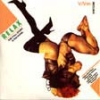 For V/VM this is love in the time of controversy, and it's especiallyfitting for them to be making some of the hottest music of theircareers while in the hottest water yet. After I obtained a copy of thisnow rare commodity through means I will not disclose — a process othersmight find difficult, as well — I immediately dimmed the lights andfired up the candles and twinkle lights to get in the right mood forthis revisiting of the Frankie Goes to Hollywood classic. Truth betold, I knew my body was about to be rocked, just not this hard and notwith so much of a history lesson involved. This being the 20thanniversary of the original release of "Relax," it seems V/VM wanted toshare some of the more interesting tidbits of the single's background,and some of the controversy that surrounded it, as well. Hence, theartwork that closely resembles the sleeve of the Frankie single, andsamples throughout the remixes of radio programmer reactions and otherstrangeness. As for the digital reconstruction that is the musicitself, I was floored by some of the showmanship involved. V/VM havegathered remixes from a number of manipulators, including Animal,Toecutter, Shitmat, The Alien Porno Midgets and more that succeed incapturing the essence of the track and then obliterating allconceptions about it. Several of the tracks don't even feature the wordthat is the song's title, cutting and splicing the bassline and choiceother phrases, creating a neo-stomp in pasting it all back together.There's odd combinations to be sure, but they work so well: the uses of"Auld Lang Syne" and "Smoke on the Water" are particularly noteworthyfor their originality and creation of an irreplaceable leitmotif in mybrain. Where other V/VM releases have seemed to pick apart and mock theartist in question, I felt that this was an earnest homage to theorginal and to the process of remixing in general. This is more of astatement than V/VM have ever made, and it hits on all levels; thusunintentionally they defy the issue that makes it difficult to find inthe first place, as well as those responsible for it.
For V/VM this is love in the time of controversy, and it's especiallyfitting for them to be making some of the hottest music of theircareers while in the hottest water yet. After I obtained a copy of thisnow rare commodity through means I will not disclose — a process othersmight find difficult, as well — I immediately dimmed the lights andfired up the candles and twinkle lights to get in the right mood forthis revisiting of the Frankie Goes to Hollywood classic. Truth betold, I knew my body was about to be rocked, just not this hard and notwith so much of a history lesson involved. This being the 20thanniversary of the original release of "Relax," it seems V/VM wanted toshare some of the more interesting tidbits of the single's background,and some of the controversy that surrounded it, as well. Hence, theartwork that closely resembles the sleeve of the Frankie single, andsamples throughout the remixes of radio programmer reactions and otherstrangeness. As for the digital reconstruction that is the musicitself, I was floored by some of the showmanship involved. V/VM havegathered remixes from a number of manipulators, including Animal,Toecutter, Shitmat, The Alien Porno Midgets and more that succeed incapturing the essence of the track and then obliterating allconceptions about it. Several of the tracks don't even feature the wordthat is the song's title, cutting and splicing the bassline and choiceother phrases, creating a neo-stomp in pasting it all back together.There's odd combinations to be sure, but they work so well: the uses of"Auld Lang Syne" and "Smoke on the Water" are particularly noteworthyfor their originality and creation of an irreplaceable leitmotif in mybrain. Where other V/VM releases have seemed to pick apart and mock theartist in question, I felt that this was an earnest homage to theorginal and to the process of remixing in general. This is more of astatement than V/VM have ever made, and it hits on all levels; thusunintentionally they defy the issue that makes it difficult to find inthe first place, as well as those responsible for it.Read More
- Administrator
- Albums and Singles
 With her previous full-lengths, Head Slash Bauch and Westernization Completed,Antye Greie-Fuchs proved entirely capable of creating beautiful andunique electronic music without the help of her Laub bandmate Von Jotkaor frequent collaborator Vladislav Delay. Reaching an early peak onlast year's Westernization, AGF's mature style is both morechallenging than her past work and more rewarding. The increasinglyabstract free-association of Greie's characteristic speak-singing seemsto have found perfect accompaniment in a new loosening of songstructure which, instead of dissolving substance, allows for thecareful buttressing of her words with basic and unclutteredsound-forms, accentuating the language and aligning the music moreclosely with the power of suggestion. The "instrumental" portion ofAGF's music remains a recognizably laptop-based affair, full of crisp,bass-less beats, clean synth-like melodic lines, and a delicateunderpinning of digital drone and flutter; however on Westernization and to a greater degree on Language is the Most,these elements are treated with greater economy of use, layered lessfrequently or abundantly, and approached with more attention to varietyand improvisational flow. It's as if Greie treats instrumental soundlike it were part of her vocal, as if these melodic shards and openrhythms have assumed fixed places in the artist's advancing word bank,lent the same concise, charged delivery as her speech. This effect isconsistent with the broader theme of Language is the Most,essentially a live recording from AGF's performance at the ArsElectronica Festival's Klangpark in 2003. The theme of the festivallast year was "Code - The Language of Our Time," and it's hard toimagine an musician engaged in a more literal dialogue between digitalcode, musical composition, and spoken language than Antye Greie. Westernization is as much sound poetry as it is patient left-field electronica, and Languagemakes the distinction even more complicated. The live setup, by forceor by choice, has Greie's voice appearing with less regularity and lessreliance on structural cues, creating music whose success is largelyreliant on the tact of the artist's speech and the resonance of herwords taken alone. Her compositions progress along astream-of-consciousness logic, incorporating numerous field recordings,samples and organic-sounding clatter to make Language AGF'smost complex listen to date, despite the equally unprecedented amountof open space appearing throughout. Compounding the event's thematicinterest in coded language, text, and the relevancy of establishedcommunication methods, Greie incorporates pieces of Westernization, as good a document of the artist's own "language" as any, into her live set. This decision has ended up granting Languagesomething of a "companion piece"-status, and while I'd be more likelyto recommend the former to new listeners, the live disc has provided anequal amount of rapturous listening and contains the seeds of newrefinement in AGF's sound, making it just as essential.
With her previous full-lengths, Head Slash Bauch and Westernization Completed,Antye Greie-Fuchs proved entirely capable of creating beautiful andunique electronic music without the help of her Laub bandmate Von Jotkaor frequent collaborator Vladislav Delay. Reaching an early peak onlast year's Westernization, AGF's mature style is both morechallenging than her past work and more rewarding. The increasinglyabstract free-association of Greie's characteristic speak-singing seemsto have found perfect accompaniment in a new loosening of songstructure which, instead of dissolving substance, allows for thecareful buttressing of her words with basic and unclutteredsound-forms, accentuating the language and aligning the music moreclosely with the power of suggestion. The "instrumental" portion ofAGF's music remains a recognizably laptop-based affair, full of crisp,bass-less beats, clean synth-like melodic lines, and a delicateunderpinning of digital drone and flutter; however on Westernization and to a greater degree on Language is the Most,these elements are treated with greater economy of use, layered lessfrequently or abundantly, and approached with more attention to varietyand improvisational flow. It's as if Greie treats instrumental soundlike it were part of her vocal, as if these melodic shards and openrhythms have assumed fixed places in the artist's advancing word bank,lent the same concise, charged delivery as her speech. This effect isconsistent with the broader theme of Language is the Most,essentially a live recording from AGF's performance at the ArsElectronica Festival's Klangpark in 2003. The theme of the festivallast year was "Code - The Language of Our Time," and it's hard toimagine an musician engaged in a more literal dialogue between digitalcode, musical composition, and spoken language than Antye Greie. Westernization is as much sound poetry as it is patient left-field electronica, and Languagemakes the distinction even more complicated. The live setup, by forceor by choice, has Greie's voice appearing with less regularity and lessreliance on structural cues, creating music whose success is largelyreliant on the tact of the artist's speech and the resonance of herwords taken alone. Her compositions progress along astream-of-consciousness logic, incorporating numerous field recordings,samples and organic-sounding clatter to make Language AGF'smost complex listen to date, despite the equally unprecedented amountof open space appearing throughout. Compounding the event's thematicinterest in coded language, text, and the relevancy of establishedcommunication methods, Greie incorporates pieces of Westernization, as good a document of the artist's own "language" as any, into her live set. This decision has ended up granting Languagesomething of a "companion piece"-status, and while I'd be more likelyto recommend the former to new listeners, the live disc has provided anequal amount of rapturous listening and contains the seeds of newrefinement in AGF's sound, making it just as essential.Read More
- Administrator
- Albums and Singles
 When feeling below the weather, this is the kind of sound that managesto pick me up and put me at peace. The cool, glass melodies andrainforest rhythms never cascade out of control leaving only the breezeand scent of spring in their wake. Calling "Über Die Wasserscheide" agentle ride might leave the impression that Cicadidaeis a simple record, but the masterful combination of live instrumentswith electronic moans is anything but that. Kammerflimmer Kollektiefhave an ear for space and fluidity — short tracks like "Blood" relate auniverse of thoughts and feelings in just over a minute while "...DennNacht Ist Jetzt Schon Bald!" unfolds in acoustic strips and wandering,mystical drum patterns. The weave of patterns andstream-of-consciousness noise-melodies play well with eachother, neverchoking out one another and never floundering in chaos; each second ofsound plays an important part in the song at just the right time. Denseor heavier moments always find themselves relieved in the caress of awoodwind instrument or the lazy kiss of a strummed guitar. "Sie TrankenRegen (Version)" ushers forth like cigarette smoke, slowly expandingthrough the room, tasting of memories, and shrouded in mystery — thedrumming pulsing from beneath a veil of jazz and the horns hover overthe lullaby of a lustful saxophone. The residue this record leavesbehind sticks to the walls and reverberates perpetually until finallyit seeps into the blood and animates the mind. Though melancholy findsits way onto the record, its the sort of sadness that only serves torejuvinate the soul and lift it back to its feet. As a little addedbonus, the latter portion of the record unfolds into a sultry dancethat can only be called sexy. Late-night excursions and secret thoughtscourse throughout "Mantra" and "Edierdaunen (Gerupft)." The variety ofcharacter that marks these songs stand out as one of the records beststrengths. There is a unique quality to the production,instrumentation, and arrangement of each tune that cannot beoverlooked.
When feeling below the weather, this is the kind of sound that managesto pick me up and put me at peace. The cool, glass melodies andrainforest rhythms never cascade out of control leaving only the breezeand scent of spring in their wake. Calling "Über Die Wasserscheide" agentle ride might leave the impression that Cicadidaeis a simple record, but the masterful combination of live instrumentswith electronic moans is anything but that. Kammerflimmer Kollektiefhave an ear for space and fluidity — short tracks like "Blood" relate auniverse of thoughts and feelings in just over a minute while "...DennNacht Ist Jetzt Schon Bald!" unfolds in acoustic strips and wandering,mystical drum patterns. The weave of patterns andstream-of-consciousness noise-melodies play well with eachother, neverchoking out one another and never floundering in chaos; each second ofsound plays an important part in the song at just the right time. Denseor heavier moments always find themselves relieved in the caress of awoodwind instrument or the lazy kiss of a strummed guitar. "Sie TrankenRegen (Version)" ushers forth like cigarette smoke, slowly expandingthrough the room, tasting of memories, and shrouded in mystery — thedrumming pulsing from beneath a veil of jazz and the horns hover overthe lullaby of a lustful saxophone. The residue this record leavesbehind sticks to the walls and reverberates perpetually until finallyit seeps into the blood and animates the mind. Though melancholy findsits way onto the record, its the sort of sadness that only serves torejuvinate the soul and lift it back to its feet. As a little addedbonus, the latter portion of the record unfolds into a sultry dancethat can only be called sexy. Late-night excursions and secret thoughtscourse throughout "Mantra" and "Edierdaunen (Gerupft)." The variety ofcharacter that marks these songs stand out as one of the records beststrengths. There is a unique quality to the production,instrumentation, and arrangement of each tune that cannot beoverlooked.Read More
- Administrator
- Albums and Singles
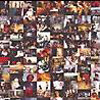 Those expecting Black Dice to travel further in the trajectory suggested by the beat-infused abrasiveness of Cone Toaster will no doubt be disappointed by Miles of Smiles. Black Dice's newest 12" on DFA is not very similar to the material on the aforementioned EP, and it doesn't share much in common with the blissful psychedelic clamor of their Beaches and Canyons album, either. It's something else entirely, an unexpected tangent into the realm of sampling and tape music.
Those expecting Black Dice to travel further in the trajectory suggested by the beat-infused abrasiveness of Cone Toaster will no doubt be disappointed by Miles of Smiles. Black Dice's newest 12" on DFA is not very similar to the material on the aforementioned EP, and it doesn't share much in common with the blissful psychedelic clamor of their Beaches and Canyons album, either. It's something else entirely, an unexpected tangent into the realm of sampling and tape music.
Both tracks appear to have been constructed by meticulous editing, like so many avant-garde tape collages. However, the effect is decidedly less academic than many works of concrete music. Miles of Smiles hits me on a visceral level; an urgent, intuitive drama that decisively pushes forward. Side A opens with the insistent chirping of crickets joined by a cacophony of looped voices and structured clouds of noise. Muffled beneath this dark fog of noise are pounding Japanese tribal rhythms. I am suddenly lifted onto a circulating jet stream of fluttering electronics, before being violently torn back by a jagged edit, pulling me into a surreal, stereophonic audio environment. Someone is shaking a rain stick, a bag of runes or a handful of mosaic tiles. It's a shamanistic invocation that sets the stage for the sudden explosion of nervous percussion and ethnic, vaguely Arabic swirls of sound. Side B is "Trip Dude Delay," a study in industrial exotica, a shrill piercing tone which gives way to stacks of mutated voices, gently coaxed and sculptured. A left turn into psychedelia sees the track dropped into a chasm of echo, a cubist hall-of-mirrors that refracts the abstraction into semi-clarity. I am suddenly caught up in a giant, cresting tsunami of noise, an adrenaline rush of forceful wind accompanied by a roll of thunder. I am swept along, riding through apexes and nadirs of sound, feeling the tension of nature's senseless brutality. Finally, I'm dumped off on a tropical island, where whacked-out Boredoms-style percussion and strangled birdsong fill the crisp, sparkling ocean air. Not unlike its photo-collage cover art, Miles of Smiles is a highly structured mosaic, yet it remains willfully disorganized, vital and surprising.
samples:
Read More
- Administrator
- Albums and Singles
 Maybe I'm getting too old, but I'm starting to suspect that some of these records that I like are imposters of records I should like. If I take a step back and look at what's going on in the disconnected quagmire that one might call a music 'scene' at the moment, it seems that there is a disproportionate number of bedroom knob twisters turning out lo-fi/hi-tech hybrids of guitar and clicky electronics that are actually worth listening to. This record by The Remote Viewer is a great case in point. It's short, maybe the length of an EP, and it's got a particular aesthetic that it sticks with: soft melodies, some effective guitar poking and proding, and a deep dubby bass that makes everything sound warm and full. This is a terrific combination of sounds and the tracks are produced with an ear for detail and for the emotive content of things like mic noise and tape hiss. The tracks with female vocals are absolutely outstanding, hedging just on the right side of the disaffected/melancholy vocal divide. In fact, the songs with vocals are some of my favorite tracks that I've heard yet this year, as the combination of clean, loud bass and particular drum programming works wonders under and sometimes over the distant, echoing voice. What I'm worried about though is the idea that these kinds of records are becoming too easy. It won't take long before bedroom electronic folk/pop is to the 00's what trip-hop was to the 90's: a good idea executed well by a few and then imitated ad infinitum until even the good examples of the idea began to lose their lustre. I hope I'm wrong about this, but I could easily hear this record playing in the background as people shop for smart knit sweaters and double mochaccino lattes. I heard Portishead once in a not-so-bohemian cafe and I thought "this has been reduced to cafe music." Well, Portishead survives, if just barely. I wonder if The Remote Viewer will fare as well? I hope so, because I can't shake the feeling that I like it.
Maybe I'm getting too old, but I'm starting to suspect that some of these records that I like are imposters of records I should like. If I take a step back and look at what's going on in the disconnected quagmire that one might call a music 'scene' at the moment, it seems that there is a disproportionate number of bedroom knob twisters turning out lo-fi/hi-tech hybrids of guitar and clicky electronics that are actually worth listening to. This record by The Remote Viewer is a great case in point. It's short, maybe the length of an EP, and it's got a particular aesthetic that it sticks with: soft melodies, some effective guitar poking and proding, and a deep dubby bass that makes everything sound warm and full. This is a terrific combination of sounds and the tracks are produced with an ear for detail and for the emotive content of things like mic noise and tape hiss. The tracks with female vocals are absolutely outstanding, hedging just on the right side of the disaffected/melancholy vocal divide. In fact, the songs with vocals are some of my favorite tracks that I've heard yet this year, as the combination of clean, loud bass and particular drum programming works wonders under and sometimes over the distant, echoing voice. What I'm worried about though is the idea that these kinds of records are becoming too easy. It won't take long before bedroom electronic folk/pop is to the 00's what trip-hop was to the 90's: a good idea executed well by a few and then imitated ad infinitum until even the good examples of the idea began to lose their lustre. I hope I'm wrong about this, but I could easily hear this record playing in the background as people shop for smart knit sweaters and double mochaccino lattes. I heard Portishead once in a not-so-bohemian cafe and I thought "this has been reduced to cafe music." Well, Portishead survives, if just barely. I wonder if The Remote Viewer will fare as well? I hope so, because I can't shake the feeling that I like it.Read More